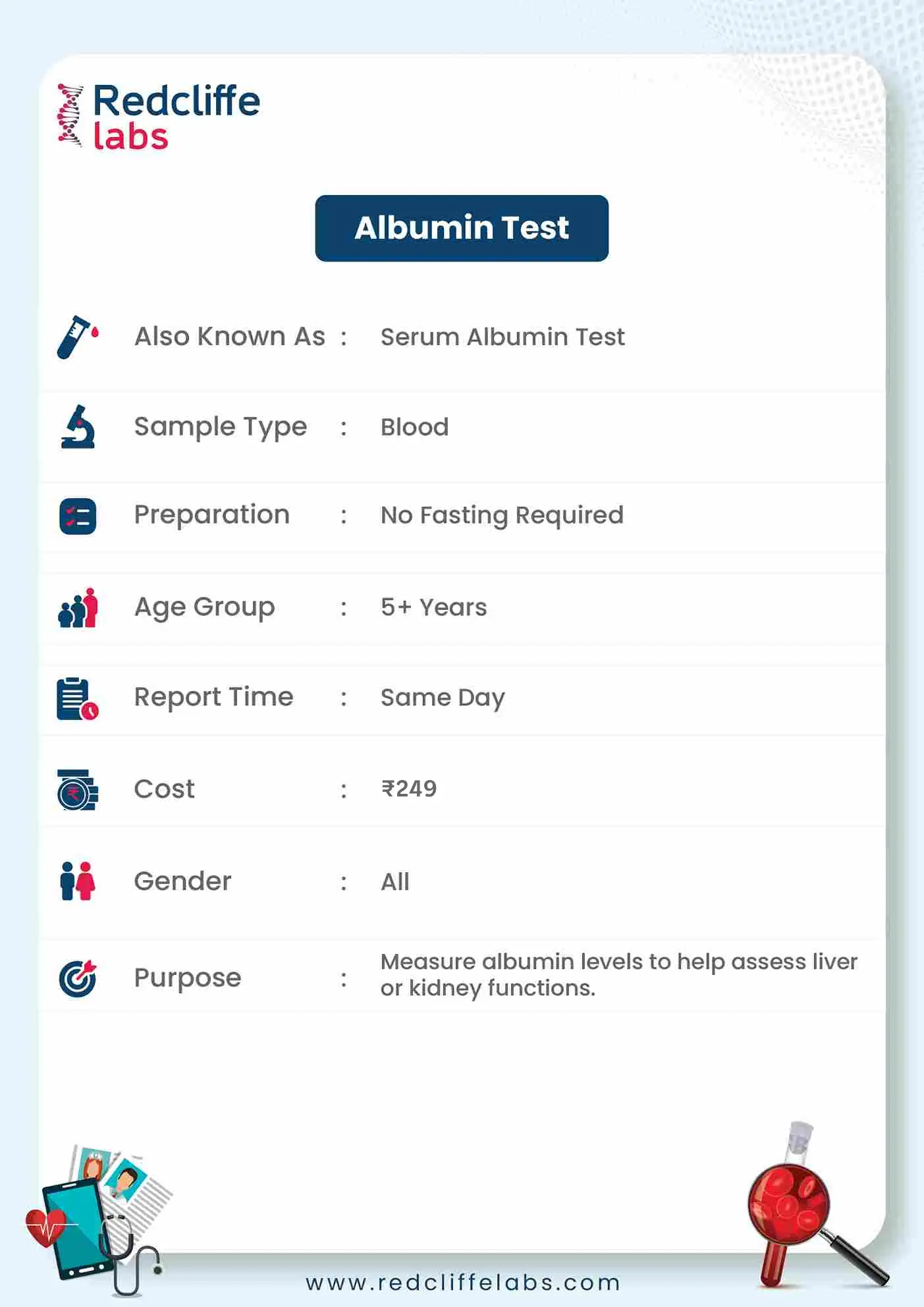Blood
Unlock special
discount on
this package
Login to Unlock 🔓
NABL Accredited lab*

Booking Benefits Unlocked Worth FREE 799

Report Consultation

Diet Plan
*Available once your report is generated.
At Redcliffe Labs, we have a single goal: to give India its right to quality diagnostics.
Customers served
Tests Processed Everyday
Cities
Collection Centres
World Class In-house Labs
Home Collection Experts
1 Test Parameters
Albumin
1 PARAMETER INCLUDED
1 PARAMETER INCLUDED
- Albumin
Top Booked Health Checkup Packages
Reports in 12 hours
|Parameters 94
Reports in 12 hours
|Parameters 89
Reports in 12 hours
|Parameters 96
Reports in 12 hours
|Parameters 96
Reports in 12 hours
|Parameters 90
Verified by Medical Expert

WRITTEN BY
Sheena Mehta

MEDICALLY REVIEWED BY
Dr. Pradeep Lodha
Table of Content
Introduction to Albumin Test
Albumin is a protein primarily synthesized in the liver and circulates throughout the bloodstream for serving varied purposes and maintaining overall well-being. From maintaining oncotic pressure and transporting substances to detoxifying waste products and supporting the immune system, Albumin is a critical marker for assessing one’s health status. The out-of-control or abnormal Albumin levels usually indicate varied medical problems, like liver or kidney diseases, inflammation & other chronic illnesses. Doctors often suggest an Albumin Test when they suspect your kidney or liver might not be working fine and may need evaluation. Early detection of abnormalities in their levels ensures timely intervention, and proper health management, leading to improved health outcomes.
If your doctor suspects you are exhibiting signs of abnormal Albumin levels or kidney or liver disease, they may suggest Albumin Test. Redcliffe Labs is the one-stop for individuals looking for a reliable diagnostic partner for Albumin Lab Tests or Albumin Tests at home. With our commitment to excellence, we provide reliable diagnostic experience, follow ethical measures, and provide accurate reports as per NABL & ISO guidelines.
Albumin Test Details In Brief:
| Also Known As | Serum Albumin Test |
| Purpose | Measure albumin levels to help assess liver or kidney functions. |
| Preparation | Do not take any over-the-counter medicine without confirming with your doctor |
| Fasting | No Fasting Required |
| Get Reports Within | Same Day |
| Cost | INR 249 |

Symptoms That May Call For Albumin Test:
A healthcare practitioner may advise an Albumin Test to individuals exhibiting symptoms related to liver or kidney diseases, such as:
Symptoms Of Kidney Problems:
- Sudden loss of appetite
- Frequent urination, especially at night
- Nausea & vomiting
- Unexplained swelling in feet, ankles, or face
- Itchiness or dryness on the skin
- Muscle cramps & weakness
- Trouble concentrating
- Too much lethargy
- Change in smell & color of urine
Symptoms Of Liver Diseases:
- Dark colored urine
- Unintended weight loss
- Jaundice
- Fatigue
- Bruises
- Unusual swelling in the belly or lungs
- Change in stool color
The type of symptoms one may experience, or severity varies for every individual. However, in some cases, especially chronic kidney disease, an individual may not present any symptoms in the early stage. Your doctor may suggest an Albumin Blood Test as a part of a routine health checkup, a part of a group of LFT, or a comprehensive metabolic panel. Remember, a doctor may suggest additional tests or interpret the results with other clinical findings to ensure an accurate diagnosis. Therefore, their consultation is critical for proper evaluation & guidance. With this in mind, Redcliffe Labs provide free doctor consultation to discuss reports so that one can understand the results better and make informed decisions.

Important Uses Of An Albumin Test:
- Helps Assess Liver Function: Often suggested as a part of the Liver Function Test, the Albumin Test helps find liver-related issues. Low Albumin Levels usually indicate liver dysfunction or other diseases like hepatitis or cirrhosis. However, your doctor may suggest additional tests to find the root cause of the problem.
- Check Kidney Function: Besides assessing liver functioning, Albumin Test helps track kidney functions and diagnose certain kidney diseases at an early stage. Damaged kidneys usually exert too much Albumin in urine.
- Helps With Nutritional Assessment: Being a major protein in the blood, Albumin indicates a person's nutritional status. Lower than normal levels indicate malnutrition or inadequate protein intake, which, if diagnosed early, can be managed well with appropriate measures.
- Ensure Early Diagnosis Of Kidney Or Liver Diseases: While assessing kidney or liver function, an Albumin Test may help identify several diseases linked to these organs, such as alcoholic liver disease, fatty liver, liver cirrhosis, etc.
- Helps With Preoperative Evaluation: The test is also suggested before major surgeries to assess an individual's nutritional and health status. The test results and other clinical findings help with surgical planning & risk assessment, enabling timely care and management.
- Monitor Treatment Response: Not only does this help diagnose liver or kidney problems, but also used in certain cases to monitor the effects or response of medical treatments. An Albumin Serum Test can be beneficial, helping healthcare providers make accurate diagnoses, monitor ongoing treatments & provide appropriate care to individuals.
All-in-all, Albumin Level Test is critical to assess kidney or liver problems and evaluate your health. The early diagnosis of abnormal Albumin levels enables one to take preventive measures while there is still time. The change in levels is related to your health. So, don’t take it for granted and act in time.
Albumin Test Normal Range:
The normal albumin levels may vary slightly among different laboratories depending on testing methods. Generally,
- Albumin Blood Test Normal Range is approximately 3.4 to 5.4 g/dL.
- The Albumin Urine Test Normal Range is less than 30mg a day.
Albumin Test Result Interpretations:
Remember, an Albumin Test alone is not enough to confirm any medical condition, and its results are analyzed with other test results to diagnose. In general:
Low Albumin Levels could be a sign of:
- Several liver/kidney diseases
- Malnutrition
- Infection
- Digestive disorders, etc.
High Albumin Levels could occur due to:
- Dehydration
- Severe diarrhea
- High protein diet
- And other conditions
Having abnormal Albumin levels doesn't always indicate a medical condition, as some medicines can also influence them. Therefore, doctors also consider other factors like medical history, symptoms, other test results (if any), and more clinical findings for accurate diagnosis.
Preparations Required For An Albumin Blood Test:
No special preparations are required for an Albumin Test. However, general guidelines that one may need to follow are:
Before The Test:
- Keep your healthcare provider informed about any ongoing prescribed or non-prescribed medicines, as some can influence the test results.
- Generally, no fasting is required for the test. However, depending on your condition, if specific instructions are advised, follow them.
- Relax and stay hydrated before the test to avoid discrepancies in the results.
- Avoid smoking or drinking before the test, as it can influence your test results.
During The Test:
- A phlebotomist will clean the site and collect the blood, inserting a sterile needle. The procedure may cause slight pain, bruise, and discomfort in the punctured area. The symptoms will be normal after a while.
After The Test:
- A phlebotomist may apply pressure on the punctured site using a cotton ball to prevent bleeding and apply a bandage to help avoid infections.
- Generally, you are allowed to resume your normal activities. However, it is advisable to follow post-test instructions provided by healthcare providers, depending on the individual's health factor.
Remember, these are general guidelines, and doctors might suggest different before and after test instructions, depending on your condition, for the most accurate results. If you have any doubts or queries related to the same, discuss them with your phlebotomists or healthcare practitioner so they can guide you accordingly.
Procedure Of A Albumin Blood Test:
The process is simple and involves the following steps:
- A phlebotomist may tie a band and clean the area using an antiseptic.
- They will collect the blood from the vein in your arm using a sterile needle, which may cause a little pinch-like pain or discomfort.
- The phlebotomist will remove the need and transfer the collected blood into the vial.
- Lastly, they will put a bandage on the punctured site to prevent bleeding or infection.
The process is quick and hassle-free and poses no specific risks than a little pain or bruise at the punctured site.

Tips To Balance Albumin Levels:
Your diet, lifestyle choices, or change in certain habits can help you regain the balance in Albumin levels. However, the specific approach right for you depends on the cause of the imbalance. Some basic tips that can help manage these levels include the following:
- Balanced Diet: Your dietary choices significantly influence Albumin levels. Therefore, people with abnormal Albumin levels are always advised to switch to a diet with all the essential nutrients, minerals, and protein in appropriate amounts to support healthy Albumin levels and overall well-being.
- Address The Kidney/Liver Problems Early: If abnormal Albumin levels are due to any damage or disease in the liver/kidney, you may be advised to manage it appropriately following the doctor's treatment. Besides maintaining your well-being, it may help you obtain healthy Albumin levels.
- Stay Hydrated: Dehydration can also influence your Albumin levels. Therefore, keeping your hydration in check is the key to bringing the balance.
- Manage Medication: If certain medications are causing the imbalance in Albumin levels, your healthcare practitioner may suggest adjustments in the dosage, depending on your condition to help you balance them well. Note: Do not alter or adjust your ongoing medicine dosage independently. It should be done following the advice of your healthcare practitioner.
- Exercise Regularly: Being physically active may help you keep your liver, kidney, or overall well-being in check, which helps manage the Albumin levels.
- Monitor Albumin Levels: Last but not least, if you have any chronic illness or are undergoing treatment, doctors may advise a routine Albumin Test to measure and monitor your levels. It should be followed as suggested so the problem can be detected and preventive measures can be initiated while there is still time.
It is essential to understand that these are general guidelines and may work differently for every individual. Before making any changes in your diet or routine, discuss it with your healthcare practitioner so that they can provide personalized changes depending on your health requirements.
Albumin Test Price @ Redcliffe Labs!
The Albumin Test Cost varies from city to city & lab to lab. While the cost may vary, we try to keep it competitive as possible. We ensure that all our tests are accessible at highly affordable rates so every individual can benefit from the same. With us, Albumin Test Price is just Rs 249 with free doorstep sample collection convenience. You can easily book this test online via our website or mobile app and get tested comfortably from home. So, what are you waiting for? Book your test now.
Other Kiney & Liver Function Tests/Packages That You Can Book With Redcliffe Labs
| Tests/Packages Name | Price in INR (May Vary According to your Selected City) |
| Creatinine Test | ₹199 - ₹229 |
| Uric Acid Test | ₹199 - ₹219 |
| Vital Screening Package | ₹799 |
| Liver Function Extended Panel | ₹699 |
| Prime Full Body Checkup | ₹699 |
| Smart Full Body Checkup | ₹999 |
| Liver Kidney Function Profile | ₹999 |
| Smart Full Body Check up with Vitamin D | ₹1259 |
Be Aware, Take A Timely Albumin Test!
Timely actions help manage several conditions before things turn ugly. Hence, delay no more, and book your Albumin Blood Test at home with us now. Redcliffe Labs is the fastest-growing diagnostic service provider that you can count on to schedule a Serum Albumin Test at home. We thoroughly test samples following ethical practices to provide accurate reports within a stipulated timeframe. We also provide Express Slots to help pick your sample up within 45 minutes. So, keep all your queries or worries aside and book your test with us now.
5 Simple Steps to Manage Your Health with Redcliffe Labs
Quick, Simple & Convenient; trusted care delivered to your doorstep.

Start Your Online Booking
Open the Redcliffe Labs website/app. Select the test or package and enter your details. Schedule the service for your preferred slot.

Live Tracking
Stay updated with real-time tracking for a smooth and timely home sample collection.

Sample Collection
Our certified experts ensure a smooth, hygienic, and fully compliant sample collection experience.

Doctor-Verified Smart Reports
Every report is clinically checked by expert doctors and shared with smart, actionable insights.

Your Health Journey Continues Post Reports
Consult with our expert medical team to get actionable insights to improve your health.
Nearby Labs(9)
Redcliffe Labs Noida

MC-5280
Redcliffe Collection Center
Redcliffe Collection Center
Redcliffe Collection Center
Redcliffe Collection Center
Redcliffe Collection Center
Redcliffe Collection Center
Redcliffe Collection Center
Redcliffe Collection Center
Frequently Asked Questions
What is Albumin in a blood test?
How to test Albumin?
What does high Albumin mean in a blood test?
Why is an Albumin Test done?
Why does Albumin increase in the blood?
How do you reduce Albumin?
Can I book a Albumin Test near me?
Can I book a home collection for a Albumin Test?
Health Articles & Blogs
My Health
Stay informed with our expert health articles and blogs. Explore comprehensive guides on diseases, nutrition, preventive care, and wellness tips to help you make better health decisions.
What to Drink to Lose Belly Fat in 1 Week

Can Exercise Really Treat Depression? What Research Says
Discover what research says about exercise and depression. Learn how physical activity may improve mood, reduce symptoms, and support mental health.

Is It Good to Eat Dried Cranberries Every Day? Benefits & Risks
Discover the health benefits and potential risks of eating dried cranberries every day, including sugar levels and portion tips.

7 Health Screenings Every Woman Above 30 Should Get Done Annually

Fat vs Muscle: Are they Different?

Can Managing High Blood Pressure Lower Uterine Fibroid Risk?

Debunking Epilepsy Myths: What Everyone Should Know

Can Diabetes Cause Alzheimer's? Understanding the Blood Sugar Brain Connection
Explore the link between diabetes and Alzheimer’s disease. Learn how high blood sugar may affect brain health, memory, and long-term cognitive function.
Explore My Health
